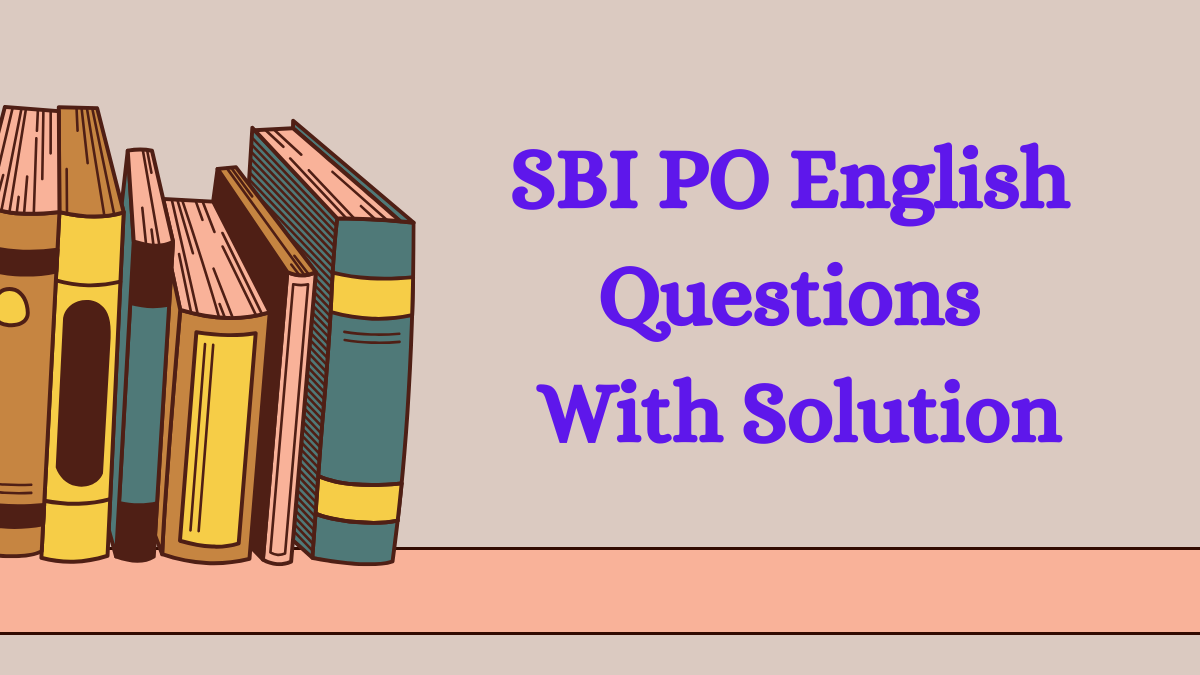Table of Contents
The SBI PO Exam evaluates candidates on various skills, including reasoning, quantitative aptitude, and proficiency in the English language. The English section is a significant scoring area in determining overall performance, especially for candidates aiming to secure a spot in the final merit list. The given article highlights insights into the English section of the SBI PO exam and provides questions along with solutions.
SBI PO English Section: Overview
The English section tests a candidate’s language command through various questions that assess vocabulary, grammar, comprehension, and communication skills. SBI PO English Question is designed to evaluate the ability to interpret written information, understand complex ideas, and convey thoughts effectively.
- SBI PO English Questions are included in both the Prelims and Mains exams.
- SBI PO English Questions tests proficiency in reading comprehension, grammar, and vocabulary.
- SBI PO English Questions emphasizes analytical and interpretative skills.
Exam Pattern for the SBI PO English Section
A good performance in the English section not only boosts the overall score but also enhances the communication skills, which are also required for the Group Discussion and Interview rounds.
Prelims Exam
- Number of Questions: 30
- Marks: 30
- Duration: 20 minutes
Mains Exam
- Number of Questions: 35
- Marks: 40
- Duration: 40 minutes
The Mains exam also includes Descriptive Writing, where candidates must write an essay and a letter, further testing their command over written English.
SBI PO English Section: Important Topics
The English section in the SBI PO 2024 exam is an opportunity to score high if approached strategically. Regular practice, coupled with a strong foundation in grammar and vocabulary, will help candidates ace this section. The important topics in the SBI PO English Section are as follows:
Reading Comprehension
- Passages from topics like finance, economics, current affairs, and general knowledge.
- Questions on central ideas, inferences, tone, and vocabulary.
Cloze Test
- Fill in the blanks within a passage using the most contextually appropriate words.
Para Jumbles
- Arrange jumbled sentences to form a coherent and meaningful paragraph.
Error Detection
- Spot grammatical errors in sentences.
Sentence Improvement
- Improve or restructure sentences for grammatical and contextual accuracy.
Vocabulary-Based Questions
- Synonyms, antonyms, and usage of idioms and phrases.
Fill in the Blanks
- Single or double blank questions to complete a sentence meaningfully.
Sentence Connectors
- Combine or connect sentences using appropriate linking words or phrases.
SBI PO English Section: Importance
The English Language section not only tests theoretical knowledge but also evaluates practical understanding and application. This makes it an important part of the exam.
- Improves overall score in both Prelims and Mains.
- Helps in clearing sectional cut-offs.
- Enhances communication skills essential for GDs and interviews.
SBI PO English Section: Preparation Strategy
- Regular Reading: Read newspapers daily to improve vocabulary and comprehension skills. Focus on the editorial section.
- Strengthen Grammar Basics: Revise fundamental grammar rules related to tenses, subject-verb agreement, prepositions, and conjunctions.
- Expand Vocabulary: Learn new words every day with their meanings, synonyms, and antonyms.
- Practice Mock Tests: Solve sectional and full-length mock tests regularly. Analyze mistakes and work on weak areas.
- Analyze Previous Years’ Papers: Go through SBI PO Previous Year Papers to understand the question pattern and difficulty level.
- Focus on Time Management: Allocate time for each question type during practice. This ensures candidates can attempt the maximum number of questions in the exam.
- Work on Descriptive Writing: Practice essay and letter writing for the main exam. Focus on structure, clarity, and grammar.
SBI PO English Questions With Solution
Direction (1-5): In each of the following questions, there are four sentences which may or may not contain an error. Choose the sentence among the four options which is grammatically correct. If there is error in all the sentences, choose (e) as your answer.
Q1. (a) The district authorities are making a last-ditch attempt to provide alternative solutions to farmers but the options is clearly inadequate.
(b) The results of the study showed that if the partners were willing to talk to each other and arrive at a mutually agreeable decision, the joint decisions were more better than one person’s judgement.
(c) He always practices the justice and cares for moral principles.
(d) We discussed the problem so thoroughly that I found it easy to work it out.
(e) None of the above.
Q2. (a) Initially, shop owners tried to offer some resistance to the demolition but seeing the heavy presence of the police force, their resistance faded off.
(b) None of the diplomats at the conference failed either to comprehend or solving the problem.
(c) The reports promoted the Chairman of the organizing committee to address a hurried press conference where he reprimanded the media for conducting a ‘prejudiced campaign’.
(d) Judge in him prevailed upon the father and he sentenced his son to death.
(e) None of the above.
Q3. (a) There is a distinctive possibility that he will leave the job once the investigation is over.
(b) The speaker was not only slow but also inaudible as well.
(c) A year after the global financial crisis saw students from the best B-schools across the world struggling for a job, a survey on management education this year thrown up some rather interesting findings.
(d) The first task is provided sufficient arable land to the dispossessed farmers.
(e) None of the above.
Q4. (a) The sole idea behind conducting such programmes is to create awareness among young minds for our culture.
(b) The whole block of flats including two shops was destroyed in fire.
(c) Three conditions critical for growing plants are soil, temperature and chemical balance or amount of moisture.
(d) Until the world lasts, the earth will go round the sun.
(e) None of the above.
Q5. (a) The youth did not dare to venture with the sea as it was a high tide.
(b) Time the concert ended, the crowd clapped and cheered enthusiastically.
(c) A vast numbers of people greeted the film star on his arrival at the airport.
(d) All the documents have been destroyed in the fire which occurred last month.
(e) None of the above.
Directions (6-15): Read each sentence to find out whether there is any grammatical or idiomatic error in it. The error, if any, will be in one part of the sentence. The number of that part is the answer. If there is ‘No error’, the answer is (e). (Ignore errors of punctuation, if any.)
Q6. Vijay worked very (a)/ hard so that he (b)/ might not keep the others (c)/ wait too long. (d)/ No error. (e)
Q7. The Short boy (a)/ has seven rupees (b)/ and the fat boy (c)/ has only a rupee. (d)/ No error. (e)
Q8. The teacher drew (a)/ an attention of the (b)/ boys to the importance (c)/ of regular practice. (d)/ No error. (e)
Q9. Whatever his intentions may be (a)/ he should consider them carefully (b)/ before he comes (c)/ to a decision. (d)/ No error. (e)
Q10. The Policemen started (a)/ firing the crowd (b)/ when the striking (c)/ workers became violent. (d)/ No error. (e)
Q11. Often in political campaigns, a point is reached (a)/ at which the candidates (b)/ take out their gloves (c)/ and start slugging with bare fists. (d)/ no error. (e)
Q12. People are worried (a)/ more because of the frequency (b)/ of occurrence of the crime rather (c)/ than the magnitude of the crime. /(d). No error. (e)
Q13. The number of students (a)/ competing in the event (b)/ has been fallen (c)/ because of want of incentive. (d)/ No error. (e)
Q14. When he used to walk (a)/ along the road, (b)/ a wild and ferocious dog (c)/ knocked him down. (d)/ No error. (e)
Q15. None (a)/ but fools (b)/ has ever (c)/ believed it. (d)/ No error. (e)
Directions (16-20): Read each sentence to find out whether there is any grammatical or idiomatic error in it. The error, if any, will be in one part of the sentence. The number of that part is the answer. If there is ‘No error’, the answer is (5). (Ignore errors of punctuation, if any.)
Q16. All his family members (a)/ are working on (b)/ some of the (c)/ higher position in the petroleum ministry (d)/ No error (e)
Q17. Please remembers that (a)/ Shanti, who acted in films, (b)/ is my cousin sister and (c) must be given grand welcome (d)/ No error (e)
Q18. They were quite all right (a)/ when they started arguing with the (b)/ so called security officer who stopped (c)/ them from entering the airport (d)/ No error (e)
Q19. In spite of his insincerity (a) / she was awarded (b)/ cent percent marks (c)/ in mathematics in the class unit test (d) / No error (e)
Q20. The English teacher said (a)/ that we should read (b)/ the chapters everyday (c) so as to memorize the chapters which will enable us to answer the objective question (d)/ No error (e)
Directions (21–30): Read each sentence to find out whether there is any grammatical error in it. The error, if any, will be one part of the sentence. The number of that part is the answer. If there is no error, the answer is (e). (ignore the errors of punctuation, if any.)
Q21. The survey gives us (a)/ much knowledge of the (b)/ public’s opinion on the (c)/ matter of terrorism. (d)/. No error (e)
Q22. Sometimes they may also show you (a)/ a fake flight ticket they booked just to meet you (b)/ but had to cancel because(c)/ of an urgent work or health issue(d)/. No error (e)
Q23. The idea of (a)/ introducing genes to correct (b)/ heritable and other disorders (c)/ are revolutionary. (d)/ No error (e)
Q24. It is appearing (a)/ to me that you (b)/ are plotting against (c)/ your friends and their parents. (d)/ No error(e).
Q25. In spite of (a)/ facing much problems, (b)/ he did not desert the (c)/ path of honesty(d)/. Bo error (e).



 GA Capsule for SBI Clerk Mains 2025, Dow...
GA Capsule for SBI Clerk Mains 2025, Dow...
 The Hindu Review October 2022: Download ...
The Hindu Review October 2022: Download ...
 Story of Haritha Vinayan Selected As IBP...
Story of Haritha Vinayan Selected As IBP...


